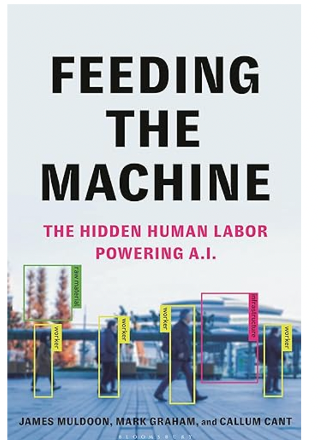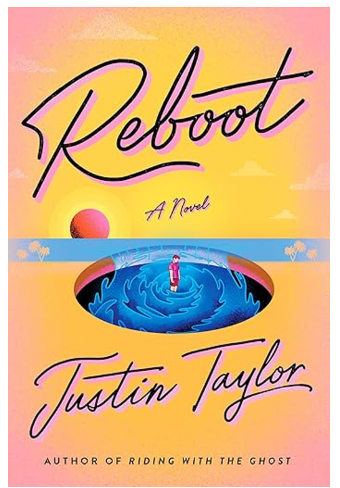
As you wind down this holiday season, here are our staff picks of the best ad tech books of 2024.
Our country may be polarized, but there’s one thing we can all agree on, 2024 was a tumultuous year. That turbulence is reflected in the books that hit the market, and are now on the nightstands of Admonsters’ writers.
This year’s must-read books expose the hidden costs of our digital transformation—from AI’s exploited workforce to facial recognition’s privacy nightmare. Whether examining memes as political weapons or algorithms reshaping culture, these titles strip away tech’s glossy veneer to reveal uncomfortable truths about power, privacy, and human agency in our connected world.
Lynne’s Leanings
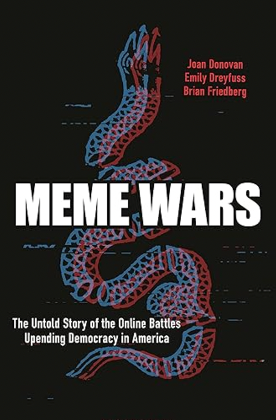 Meme Wars: The Untold Story of the Online Battles Upending Democracy in America
Meme Wars: The Untold Story of the Online Battles Upending Democracy in America
Joan Donovan, Emily Dreyfuss, Brian Friedberg
To Joan Donovan and company, memes are no joke. By wrapping messages in humor and emotion, these viral powerhouses bypass our usual fact-checking defenses, spreading political narratives far more effectively than traditional media. From election outcomes to protest movements, meme creators have mastered the art of turning simple jokes into serious influence—and changed how we fight modern political battles.
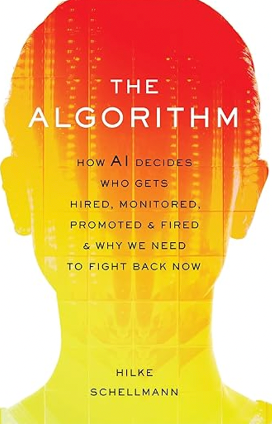 The Algorithm: How AI Decides Who Gets Hired, Monitored, Promoted & Fired & Why We Need to Fight Back Now
The Algorithm: How AI Decides Who Gets Hired, Monitored, Promoted & Fired & Why We Need to Fight Back Now
Hilke Schellmann
Okay, this book isn’t about the digital ad-tech industry, but its warning still applies: don’t trust the algorithm to have your back. Wall Street journalist Hilke Schellmann takes us through the AI that decides who gets a job interview—and, well, all the steps in the book’s title. But the AI-powered tools HR departments rely on mess up more than they get things right, and it has terrible consequences on the people who counted on their jobs to pay the bills (and the managers who must obey the algorithm and fire good workers).
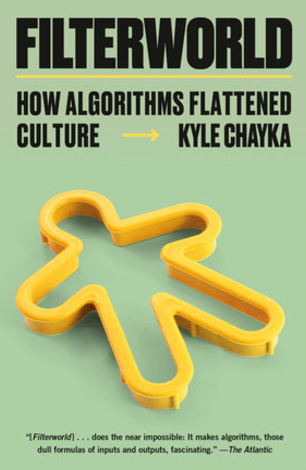 Filterworld: How Algorithms Flattened Culture
Filterworld: How Algorithms Flattened Culture
Kyle Chayka
When this book first came out, everyone talked about how the algorithms made every coffee shop in the world look the same (big windows, industrial-looking wooden tables, subway tiles). I admit it’s fascinating to see how ratings affect search results, which in turn drive interior design.
What we often overlook about this book is how a few internet giants have colonized the web, misleading us into believing we have access to all its content. They use algorithms to trick us into thinking that what they have is what we want. To wit: if a well-known streaming service suspects you’re African American, its movie thumbnails will feature African American actors, even if they played minor roles in the films.
Andrew’s A-List
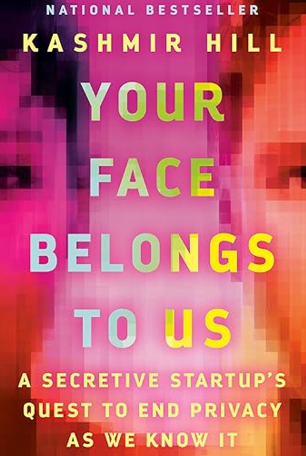 Your Face Belongs To Us: A Secretive Start’s Quest to End Privacy as We Know It
Your Face Belongs To Us: A Secretive Start’s Quest to End Privacy as We Know It
Kashmir Hill
New York Times tech journalist Kashmir Hill has been warning us about Clearview.ai for a while now and the implications of facial recognition apps on our privacy. Here’s the deal: Imagine walking down the street and someone snaps your photo. They then run it through the Clearview app, which identifies who you are and associates everything on the web related to you—your social media posts, place of work, where you live, and how much you paid for your home.
Clearview began building its database of faces by scraping Venmo and then moved on to social media. By the time Hill realized what was happening, Clearview had billions of images. But the company is hardly alone. Hill describes how plenty of other companies have been scraping our images and selling them to others who want to develop apps, many of which are unsavory. Only one state, Illinois, protects its citizens from such intrusions.
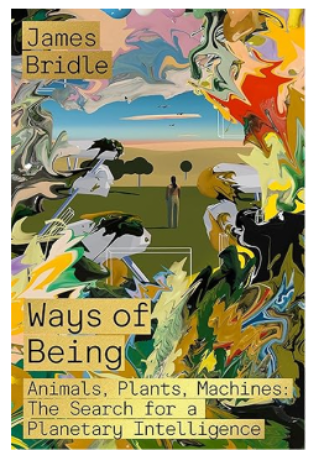 Ways of Being” Animals, Plants, Machines: The Search for Planetary Intelligence
Ways of Being” Animals, Plants, Machines: The Search for Planetary Intelligence
James Bridle
What do self-driving cars and trees have in common? Intelligence, or so says James Bridle in Ways of Being. Humans tend to overlook the intelligence of the creatures around us because they don’t interact with the world like we do. But look at the world the way they do, and we realize that intelligence abounds. Bridle is part of the growing ecological humanities movement, a multidisciplinary field that studies the relationship between humans and the environment. It also raises fundamental questions about intelligence.
Feeding the Machine: The Hidden Human Labor Powering A.I.
Callum Cant, James Muldoon, Mark Graham
AI has a dirty little secret: a workforce of millions who labor in appalling conditions powers it up. Drawing from a decade of research and hundreds of interviews, Feeding the Machine shows us the human cost of AI—from content moderators and data annotators to warehouse workers. Their grueling, poorly paid work follows familiar patterns—exploiting workers based on class, gender, and ethnicity, but with new digital window dressing. While Silicon Valley promises AI will benefit humanity, this investigation wants us to know that it’s an extraction machine feeding off human labor.
Susie’s Selects
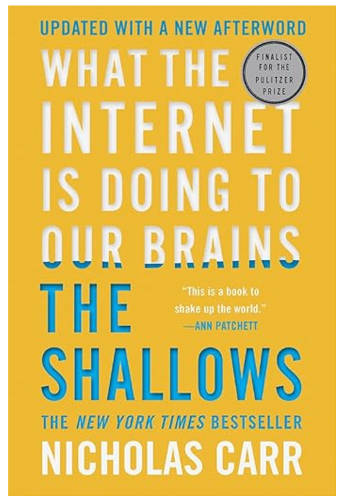 The Shallows: What the Internet is Doing to our Brains
The Shallows: What the Internet is Doing to our Brains
Nicholas Carr
It’s an oldie but goodie, with a bit of an update if you read it years ago when it first came out. What I loved about this book is the history of reading and writing (did you know the ancient Greek philosophers opposed writing, believing it would have a deleterious effect on memory)? As the book blurb says, “The Shallows has become a foundational book in one of the most important debates of our time: As we enjoy the internet’s bounties, are we sacrificing our ability to read and think deeply?”
Justin Taylor
Ahh, the power of redemption in the Internet age. Former teen star David Crader is washed up—just doing video game voiceovers between alcohol relapses. When his ex-wife/co-star Grace suggests rebooting their old Buffy-clone TV show “Rev Beach,” he sees a shot at redemption. But in a climate-ravaged America gripped by far-right conspiracies, reviving this teen drama might accidentally ignite a powder keg. It’s a darkly funny take on millennial nostalgia, internet culture, and our desperate wish for do-overs.
